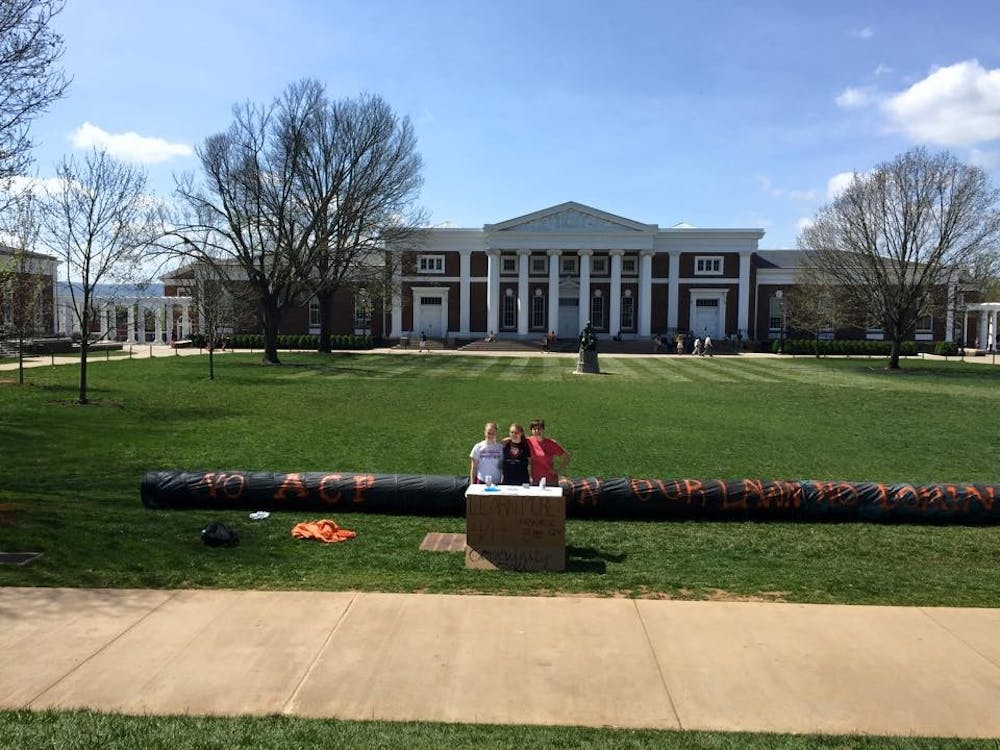Climate Action Society members assembled and unveiled a 55-foot long pipeline on the South end of the Lawn Monday in an effort to protest the Atlantic Coast Pipeline. The pipeline — proposed by Dominion Power — would transport natural gas from West Virginia to the edge of North Carolina.
If approved, the pipeline will cut directly through and severely impact areas of Charlottesville and its surrounding localities, most notably Nelson and Augusta Counties. Second-year College student Hannah Beaman, Climate Action Society president, said the artwork on the Lawn was completed and displayed to simulate the effects of the Atlantic Coast Pipeline.
“The construction of a pipeline that cuts through Virginians' property and our forests and landscapes, as an investment in fossil fuel combustion that is flooding our coastlines, sends a clear message that this place and these people are means to a short-term profit end,” Beaman said. “I hope that people who see our exhibit and learn more about the [Atlantic Coast Pipeline] do feel violated and indignant.”
Climate Action Society hosted a panel Tuesday of community organizers and local grassroots organizations. Among those present was Kirk Bowers, the state chair of the Pipeline Committee of the Virginia chapter of the Sierra Club, Hannah Wiegard, Campaign Coordinator of the Appalachian Voices, and Charlotte Rea, a local landowner and co-chair of the anti-pipeline group “All Pain, No Gain.”
Bowers spoke about the Mountain Valley Pipeline, projected to run from northwestern West Virginia to southwestern Virginia, cutting through Roanoke County.
“The Mountain Valley Pipeline runs a mile from where I grew up in Roanoke County,” Bowers said. “Mountains are sacred and my family’s been there for hundreds of years. It shocked me and I thought we really should take some action here. Overall though, I do this because I’m concerned about our changing environment. I have grandkids and I’m concerned with their future and their grandkids’ futures.”
Rea said she got involved when she learned of Dominion’s plans to build a pipeline through her property.
“What got me involved initially was that [Dominion] was going to run a pipeline 42 inches through my backyard,” Rea said. “If they build this pipeline, I believe it will be the largest environmental disaster in the state of Virginia.”
Wiegard explained that her employer, Appalachian Voices, was founded in 1997 in response to a resurgence in the building of coal mines, but has shifted to accommodate issues of fracking and pipeline construction.
“Questions we got from the community shifted to being about pipeline stuff. We sort of realized that one of our slogans is ‘I love mountains’ but to live up to that we need to contribute the resources we can to one thing,” Wiegard said. “Some of the ways we’re trained is simply to communicate stories, especially about pipelines and fracking in North Carolina.”
Bowers said one way to stop Dominion Power and other business from building pipeline after pipeline is to continue filing lawsuits against them, especially regarding confiscation of property under eminent domain.
“There have been roadblocks, but we did win a lawsuit. We’re back in the cycle again,” Bowers said. “We’ve had little successes here and there. In Nelson County, we brought the [Federal Energy Regulatory Commission] down. We took up a briefing to show all the impacts.”
Bowers said he disapproves of the Virginia state government for inadequately addressing conservation issues. He particularly spoke out against Gov. Terry McAuliffe for his support of the Atlantic Coast Pipeline.
“He’s been very disappointing on the pipeline issue. He had a press conference last October in which he came out in support of the Atlantic Coast Pipeline,” Bowers said. “We asked him why and he doesn’t have a reason for it. He didn’t have to come out and say anything and he shouldn’t have said anything, especially after all the support the Sierra Club gave him in getting elected. We hear he wants to be known as the ‘environmental governor,’ but he’s not quite on target, let’s just say.”







